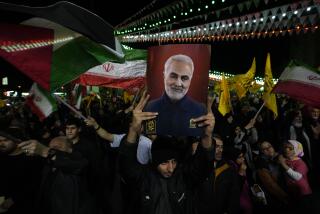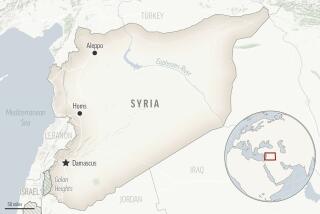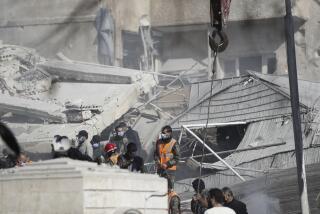In Syria, Arab League holds talks with Assad
An Arab League delegation tasked with helping to end violence in Syria met Wednesday with President Bashar Assad, as antigovernment activists said a general strike paralyzed parts of the country and that 17 more people had been killed.
Meanwhile, tens of thousands of Syrians chanting pro-Assad slogans gathered in central Damascus in a boisterous, nationally televised rally probably timed to coincide with the arrival of the Arab League delegation.
An Arab League official told reporters that “frank and friendly” talks had been held with the president and more were planned, but no breakthrough was reported in efforts to end the bloody seven-month rebellion. The Arab League said it was trying to foster dialogue in Syria, but it faces a daunting challenge in the heavily polarized nation.
Opposition groups demanding Assad’s ouster contend that dialogue with the president is futile. Syrian officials have viewed the league’s mission with mistrust.
Gulf nations seeking to suspend Syria’s membership from the league over what the United Nations and others have labeled a brutal crackdown on protesters were unable to gain enough support within the 22-member organization.
The government in Damascus has repeatedly assailed “foreign interference” and a “conspiracy” backed by Washington and its regional allies. Syria denies that its security forces have fired on peaceful protesters.
The Obama administration has joined other Western governments in calling for Assad to step down.
The State Department said Wednesday that Robert S. Ford, the U.S. ambassador who last weekend was temporarily withdrawn from Syria, would probably return to Damascus by the end of next month. Officials say the high-profile envoy was called back to Washington because of threats to his safety after his vocal support for antigovernment protesters in Syria.
Human Rights Watch called on the Arab League to press Syria to admit international observers to scrutinize the conduct of security forces. Syria has limited the access of international observers and journalists, making it difficult to determine what is happening.
“The only way to make sure civilians are protected is to have on-the-ground monitors whose presence would inhibit abuse by the security services,” said Sarah Leah Whitson, Middle East director at Human Rights Watch.
Damascus and its allies are wary of what they view as any slippery slope toward international intervention. They are mindful of the recent conflict in Libya, where Moammar Kadafi was overthrown with the help of a North Atlantic Treaty Organization bombing campaign launched on the legal basis of protecting civilians.
The Assad administration says it already has enacted a series of reforms, including a planned rewrite of the constitution. Opponents say the changes will only keep control in the hands of the Assad family, which has ruled Syria for more than four decades.
Anti-Assad activists said the general strike had led to shuttered shops and many employees not going to work in various parts of the country, including the western city of Homs, a focal point of protest. Of 17 people killed Wednesday, activists said, 10 died in Homs, which lately has experienced daily violence.
Activists said the strike, ongoing for days in some areas, had restricted economic activity in several other anti-Assad hot spots, including Idlib province in the northwest and the southern province of Dara, where the protest movement erupted in mid-March.
More than 3,000 people have been killed since antigovernment protests began, according to the United Nations.
The massive pro-Assad gathering in Damascus’ central Umayyad Square was the latest government-sponsored rally designed to show that the president still enjoys robust backing. The opposition calls the rallies staged events meant to bolster a tottering regime.
More to Read
Start your day right
Sign up for Essential California for news, features and recommendations from the L.A. Times and beyond in your inbox six days a week.
You may occasionally receive promotional content from the Los Angeles Times.






